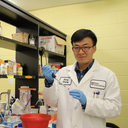Trillium tschonoskii steroidal saponins suppress the growth of colorectal Cancer cells in vitro and in vivo.
Mots clés
Abstrait
BACKGROUND
Saponins of many herbs are known to possess anti-cancer effect.
OBJECTIVE
The present study aimed to investigate the growth inhibitory effect of Trillium tschonoskii steroidal saponins in a mouse model of colitis-associated colorectal cancer and a human colorectal cancer cell line HT-29, and isolate some major constituents and evaluate their anti-tumor activity.
METHODS
Forty male ICR mice were administered with 1, 2-dimethyl-hydrazine (DMH) and dextran sodium sulfate (DSS). Ten mice were given no further treatment, the rest were administered with different doses of TTS (5, 10, 20mg/kg) orally, every three days from the 9th week to the 20th week.
RESULTS
TTS effectively protected ICR mice against DMH/DSS-induced tumorigenesis. The incidence of tumor development was 90% (9/10) in the mice treated with DMH/DSS, but that was reduced to 50% (5/10), 40% (4/10), and 20% (2/10), respectively, in the mice treated with 5%, 10%, and 20% of TTS. Results of Ki-67 staining, TUNEL assay and caspase-3 activity assay revealed that TTS moderately decreased abnormal proliferation and increased apoptosis of colonic epithelial cells. It inhibited the growth and triggered the apoptosis of HT-29 cells, partly through suppressing mitogen-actived protein kinases (MAPKs) and triggering mitochondrial-mediated apoptotic pathway. Three compounds, namely, Paris saponin VII, polyphylloside III and Paris saponin VI, were important active compounds in TTS.
CONCLUSIONS
These data suggest that TTS has a potential role in clinical prevention and treatment for colorectal cancer.





